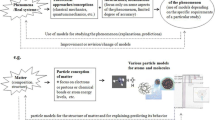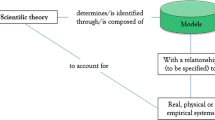Abstract.
Model theory in contemporary philosophy of science interprets scientific theories as sets of models, and contributes significantly to the understanding of the relation between theories, models, and the real world. The clarification of this relation is fundamental for the understanding of the nature of scientific methods and scientific knowledge and can contribute to the shaping of epistemologically pertinent educational models in science education. We initially present a reconstruction of the most important model-based contributions concerning mainly the nature, construction and the functions of theoretical models. Our interest focuses particularly on the theory structure scheme of the model-based view, which Ronald Giere explicitly formulated using as a paradigm the structuring of classical mechanical models, and which we extend to become a base for a structuring of basic quantum mechanical models. We consider this scheme to provide an adequate basis for the structuring of school science contents; and further propose in outline a way of structuring typical physics content, in which the topics are presented as theoretical models of the same theory, together with the modelling rules that led to their construction, and also some examples of their empirical application.
Similar content being viewed by others
References
Adúriz-Bravo A., Izquierdo-Aymerich M. (2005) Utilizing the 3P-model to Characterize the Discipline of Didactics of Science. Science & Education 14:29–41
Boyd R.N. (1983) On the Current Status of the Issue of Scientific Realism. Erkenntnis 19:45–90
Bunge, M. (1970) Physik und Wirklichkeit. In: Krüger L. (eds.), Erkenntnisprobleme der Naturwissenschaften, Köln
Devitt M. (1991) Realism and Truth (2nd edn.). Blackwell, Oxford (UK) & Cambridge (USA)
Duhem P. (1978) Ziel und Struktur der physikalischen Theorien. Meiner, Hamburg
Feyerabend P.K. (1981) Probleme des Empirismus. Vieweg, Braunschweig
Fischler H., Lichtfeld M. (1992), Modern Physics and Student’s Concepts. International Journal of science Education 14:181–190
van Fraasen B.C. (1980) The Scientific Image. Oxford University Press, Oxford
Giere R.N. (1988) Explaining Science. A Cognitive Approach. University of Chicago Press, Chicago
Giere R.N (1999) Science without Laws. University of Chicago Press, Chicago & London
Götschl J. (1980) Theorie. In: Speck J. (eds), Handbuch wissenschaftstheoretischer Begriffe, Band 3. Vandenhoeck and Ruprecht, Göttingen, pp. 636–646
Grandy R.E. (1992) Theories of Theories, A View from Cognitive Science. In: Earman J. (eds), Inference, Explanation, and other Frustrations. Essays in the Philosophy of Science. University of California Press, Berkeley, pp. 216–233
Grandy R.E. (2003) What Are Models and Why Do We Need Them?. Science & Education 12:773–2003
Grandy, R.E. & Duschl, R.A.: 2005, ‘Reconsidering the Character and Role of Inquiry in School Science: Analysis of a Conference’ (Paper presented at the International History and Philosophy of Science and Science Teaching Group meeting in Leeds, England, July 15–18, 2005), http://www.ruf.rice.edu/∼rgrandy/ConferenceInfo.html
Halloun I.A. (1998) Interactive Model-Based Education: An Alternative to Outcomes-Based Education in Physics. South African Journal of Science 94:1–14
Halloun I.A. (2004) Modelling Theory in Science Education. Kluwer Academic Publishers, Dordrecht
Izquierdo, M. & Adúriz-Bravo, A.: 2001, ‘Contributions of the Cognitive Model of Science to Didactics of Science’, Fifth International Conference of the IHPST Group, Denver, pp. 1–11
Justi R.S., Gilbert J.K. (2003) Teachers’ views on the nature of models. International Journal of Science Education 25:1369–1386
Kuhn T.S. (1974a) Logik der Forschung oder Psychologie der wissenschaftlichen Arbeit. In: Lakatos I., Musgrave A. (eds), Kritik und Erkenntnisfortschritt. Vieweg, Braunschweig, pp. 1–23
Kuhn T.S. (1974b) Bemerkungen zu meinen Kritikern. In: Lakatos I., Musgrave A. (eds), Kritik und Erkenntnisfortschritt. Vieweg, Braunschweig, pp. 223–269
Kuhn, T.S.: 1989, Die Struktur wissenschaftlicher Revolutionen (10. Aufl.), Suhrkamp-Taschenbuch, Frankfurt am Main
Lakatos I. (1974) Falsifikation und die Methodologie wissenschaftlicher Forschungsprogramme. In: Lakatos I., Musgrave A. (eds), Kritik und Erkenntnisfortschritt. Vieweg, Braunschweig, pp. 89–189
Losee J. (1990) A Historical Introduction to the Philosophy of Science. University Press, Oxford
Matthews M.R. (1994) Science Teaching. Routledge, New York-London
Matthews M.R. (2005) Idealization and Galileo’s Pendulum Discoveries: Historical, Philosophical and Pedagogical Considerations. In: Matthews M.R., Gauld C.F., Stinner A. (eds), The Pendulum, Scientific, Historical, Philosophical & Educational Perspectives. Springer, The Netherlands, pp. 209–235
Nersessian, N.J.: 2005, Model-based Reasoning in Scientific Practice, http://www.ruf.rice.edu/∼rgrandy/ConferenceInfo.html
Nola R. (2004) Pendula, Models, Constructivism and Reality. Science & Education 13:349–377
Popper K. (1974) Die Normalwissenschaft und ihre Gefahren. In: Lakatos I., Musgrave A. (eds), Kritik und Erkenntnisfortschritt. Vieweg, Braunschweig, pp. 51–57
Popper, K.: 1989, Logik der Forschung, 9. Aufl., Mohr, Tübingen
Sneed J.D. (1980) Theoriedynamik. In: Speck J. (eds), Handbuch wissenschaftstheoretischer Begriffe, Band 3. Vandenhoeck and Ruprecht, Göttingen, pp. 646–653
Stegmüller, W.: 1971, ‘Das Problem der Induktion: Humes Herausforderung und moderne Antworten’, in H. Lenk (ed.), Neue Aspekte der Wissenschaftstheorie, Braunschweig
Stegmüller, W.: 1985, Probleme und Resultate der Wissenschaftstheorie und analytischen Philosophie, Band II: Theorie und Erfahrung, Zweiter Teilband: Theorienstrukturen und Theoriendynamik, 2. korrig. Aufl., Springer-Verlag, Berlin, Heidelberg, New York, Tokyo
Stöckler M. (1995) Theoretische Modelle im Lichte der Wissenschafttheorie. Praxis der Naturwissenschaften – Physik 1:16–22
Suppe F. (1977) The Structure of Scientific Theories (2nd edn.). University of Illinois Press, Urbana and Chicago
Author information
Authors and Affiliations
Corresponding author
Rights and permissions
About this article
Cite this article
Develaki, M. The Model-Based View of Scientific Theories and the Structuring of School Science Programmes. Sci & Educ 16, 725–749 (2007). https://doi.org/10.1007/s11191-006-9058-2
Received:
Accepted:
Published:
Issue Date:
DOI: https://doi.org/10.1007/s11191-006-9058-2




